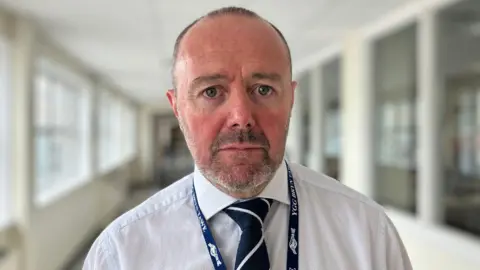Mental health cited for pupils missing school
 Getty Images
Getty ImagesPanic attacks, anxiety, and problems with mental health are among the reasons given by children who avoid going to school, amid a rise in absenteeism in Wales.
Figures show 40% of secondary school pupils in Wales missed, on average, an afternoon a week of the past school year.
One school head said teachers were having to resort to driving to pupils' homes to try and get them back into the classrooms.
Education Secretary Lynne Neagle said the Welsh government was funding training for teachers and school staff to support pupils' mental-health needs.
Pupils who are persistently absent because they feel anxious about school comes under the banner of emotionally-based school avoidance (EBSA).
Liam from Newport, 14, who is neurodivergent and has been prescribed medication for his mental health by a psychiatrist, has missed long periods of school over several years.
"I never liked going to school. Never wanted to go out every day," he said.
"It made me feel stressed, anxious, nervous, obligated."
He has not been in a school setting since 2022 but has had periods of home tutoring funded by the local authority, as well as specialist support.

"There’s loads of things that I want to do in the future, that I want to have the money to do, but if I don’t have GCSEs, I don’t feel I’ll be able to get a good enough job with a good wage."
His parents, who both work in the education sector, said they had had to reduce working hours to be at home with him.
"There’s been very few positive experiences," said his mother, Abby.
"But when you do manage to find that member of staff that gets it - whether it’s from their own experience or training - they’re like gold dust."
One pupil from Gwynedd, Elsi - not her real name - said she would hide under her kitchen table and lock herself in her bedroom because the thought of going to school triggered panic attacks.
She eventually dropped out of school due to social anxiety and mental-health difficulties.
Her mother, Fflur - also not her real name - said her daughter would cry and have panic attacks before going to school.
"At the worst part, [she] would start biting myself, kicking myself in the back and crying a lot," said Fflur.
"Even thinking about going to the school would cause a panic attack. The children, the screaming, the shouting, the running around.
"About a couple of years after, she did start self-harming."
She said her daughter experienced suicidal ideation and was twice admitted to hospital.

Persistent absence in Wales is now defined as those who miss 10% of school sessions.
In March, figures for secondary schools showed 40% of pupils had been persistently absent in 2022-23, compared with 17% in 2018-19.
Although recent monthly figures have shown some improvement, one school in Swansea has had to put extra plans in place to try and get pupils back.
Simon Davies, head teacher at Ysgol Gyfun Gymraeg Bryn Tawe, said: "Heads of Years, with pastoral support officers, have gone out to homes.
"I know that also happens at other schools."
Assistant head Mark Bridgens, who is responsible for wellbeing at the school, said he was concerned about children’s safety.
"Teachers are now becoming mental-health specialists," he said.
"When they’re not in school, you do worry. I think there is a risk of a crisis on the horizon."

Ann John, professor in public health and psychiatry at Swansea University, warned of the impact poor attendance will have on children's prospects in the future.
"If we see attendance as a marker - as a symptom of other problems - if we’re not addressing those, then we’re storing and saving them up for later," she said.
Education Secretary Lynne Neagle, who chairs an attendance taskforce to try to address the problem, said: "It’s difficult to find a silver bullet in this space, but mental-health support in school is really a big part of the solution.
"Every child aged year six and above is entitled to access school counselling in Wales. We’re funding training for the teachers and school staff so that they can better support pupils, and we’ve got our CAMHS [Child and Adolescent Mental Health Services] in-reach."
The Welsh Conservatives' shadow education minister, Tom Giffard MS, accused the Labour government of having "no plans to tackle soaring absenteeism in Wales".
A Plaid Cymru spokesperson said: "The recommendations of any taskforce must be carried out urgently or Labour will continue to fail our children."
If you have been affected by any issues raised in this article, help and support can be found at BBC Action Line.
